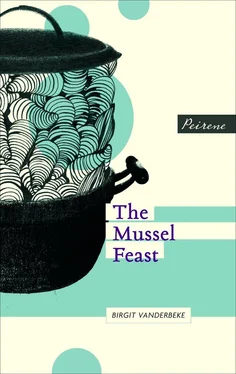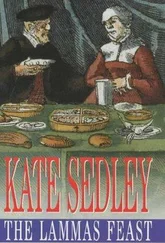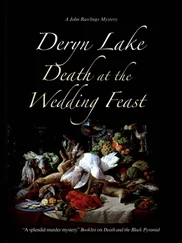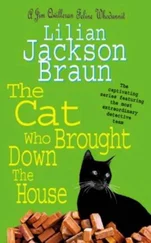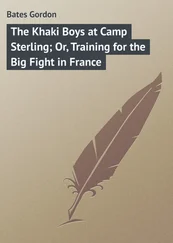Birgit Vanderbeke - The Mussel Feast
Здесь есть возможность читать онлайн «Birgit Vanderbeke - The Mussel Feast» весь текст электронной книги совершенно бесплатно (целиком полную версию без сокращений). В некоторых случаях можно слушать аудио, скачать через торрент в формате fb2 и присутствует краткое содержание. Год выпуска: 2013, Издательство: Peirene Press, Жанр: Современная проза, на английском языке. Описание произведения, (предисловие) а так же отзывы посетителей доступны на портале библиотеки ЛибКат.
- Название:The Mussel Feast
- Автор:
- Издательство:Peirene Press
- Жанр:
- Год:2013
- ISBN:нет данных
- Рейтинг книги:3 / 5. Голосов: 1
-
Избранное:Добавить в избранное
- Отзывы:
-
Ваша оценка:
- 60
- 1
- 2
- 3
- 4
- 5
The Mussel Feast: краткое содержание, описание и аннотация
Предлагаем к чтению аннотацию, описание, краткое содержание или предисловие (зависит от того, что написал сам автор книги «The Mussel Feast»). Если вы не нашли необходимую информацию о книге — напишите в комментариях, мы постараемся отыскать её.
A mother and her two teenage children sit at the dinner table. In the middle stands a large pot of cooked mussels. Why has the father not returned home? As the evening wears on, we glimpse the issues that are tearing this family apart.
"I wrote this book in August 1989, just before the fall of the Berlin Wall. I wanted to understand how revolutions start. It seemed logical to use the figure of a tyrannical father and turn the story into a German family saga."
The Mussel Feast — читать онлайн бесплатно полную книгу (весь текст) целиком
Ниже представлен текст книги, разбитый по страницам. Система сохранения места последней прочитанной страницы, позволяет с удобством читать онлайн бесплатно книгу «The Mussel Feast», без необходимости каждый раз заново искать на чём Вы остановились. Поставьте закладку, и сможете в любой момент перейти на страницу, на которой закончили чтение.
Интервал:
Закладка:
The mussels sat silently in the bowl; they were dead. And now my mother was worried that our behaviour was too insubordinate; she complained that she’d made a massive effort with our upbringing, but we knew she’d never dared contradict our father, whose promotion would definitely be in the bag now; she had massive respect for our father because he was a scientist, which was better than being an aesthete. Back then the deal was that I’d take the science route, too, because music and literature, all forms of culture in fact, were deemed hobbies, and there could be no progress in the world if scientists and engineers didn’t investigate and act with rigour and resolve; whereas music, my father said, was pure excess and would never get any engine started. He said this because ever since their escape to the West my mother’s violin had lain in their bedroom wardrobe, and only occasionally, when she was sad, would she sit at the piano, playing and singing Schubert songs, the whole of the Winterreise, back and forth, crying all the while. She sounded dreadful, even though her voice must have been beautiful at one time. We only ever heard her play the violin once, when she also cried, and we bit our lips to stop ourselves from laughing, because her playing sounded ghastly, a real cacophony; she sobbed, saying that it was not surprising her violin grated so horribly. It sat in the cold wardrobe, that was no place for a violin, and she hadn’t played it for years; then we felt sorry for her. One day she took her violin out of the wardrobe — she’d occasionally take it out in secret — only to find it broken; she sat on the bed in their ice-cold bedroom, staring at the violin and sobbing, and then returned it to its green case, a proper burial: she buried the violin case in the wardrobe and came tear-stained out of the bedroom. My father hated my mother’s tears and sentimentality, but sometimes he’d hug her, soothing her, come on, you’ve got us, haven’t you, only so she’d stop; sentimentality sent shivers down his spine, the tears come too easily, he said to my mother. My father regarded himself as a man of reason, and considered abstract logic to be a thing of great beauty. Whenever my mother said, such a shame, your lovely baritone voice, a shame you never make anything of it, he would become rather dismissive and embarrassed, even though mathematics and music basically have a lot in common, my parents never talked about the similarity, unfortunately; it never occurred to them: my mother because she thought that she was an emotional person, she loved picking flowers and twigs, she’d always come back from walks with flowers and twigs, much to my father’s annoyance; while my father never talked about the relationship between music and maths because he was focused on getting engines started. My mother, too, thought that engines needed to be started, but sometimes she suspected that beauty got rather short shrift; she always found logical thought dry and inconceivable, and in the evenings my father’s logical conclusions gave her no pleasure. The beauty of these conclusions remained a total mystery to all of us; he was the only one in the family to sense this beauty, and that evening, when the mussels were sitting in their bowl on the table in front of us, the beauty problem appeared even more obscure, but still our mother tried to tone down our behaviour, saying that we’d been a happy family, too, reminding us that we’d always eaten mussels, and even the preparation for a mussel feast was good fun. But then she didn’t sound so sure, because she didn’t care too much for mussels, and I said, well, I’m never eating mussels again, for me the fun’s over, and I got goose bumps again; the hair on my arms stood on end when I looked at the mussels in their bowl and thought of how they’d opened in the pan, their surrender; of course you can’t call it surrender, their opening and closing is purely mechanical, and yet surrender came to mind. I loathe surrendering; I’ve always striven to be strong and courageous. Then, tentatively, I said something that had often struck me: why in this world does everything have to keep going on, why can’t it stop; I think this going on and on should stop; and my brother added, yes, especially the torture, the torture of humans. Shhh, my mother said, as she was afraid he might hear us; he wasn’t there, of course, but that was what we were like, we thought he knew everything and could see and hear everything, even though we realized how impossible this was; then again, with everyone blabbing about everyone else, he did manage to find out a lot. Mum always said that we had to stick together, and she said it that evening, too. If we all stuck together then we’d be a proper family. They’d stuck together, too, when the entire village was outraged by the marriage; my parents’ marriage turned into an awful scandal, an awful village scandal, but my father didn’t want an abortion, out of the question; after all, he had a sense of responsibility and morals, even when he was young he had them in spades, and so they needed to stick together while my father studied, and even more so later on in the refugee camp, because he was logical and abstract, whereas my mother was simply concrete and practical. If they hadn’t stuck together it would have ended badly. Once, in the camp, my father tried to work as a builder for a day, but stopped in the afternoon. I’m not cut out for that sort of work, he said; he loathed and despised all menial work, and it was good that they stuck together. My mother earned money and did menial work, boiling the nappies in that huge pot, and cooking and shopping and children, all of which drove him nuts; my father was not cut out for such trivial jobs, and back then we would have frozen if my mother hadn’t lugged sacks of coal. If I didn’t have you, he said, but the refugee camp still drove him nuts, for there were no decent jobs for him; he found the endless dealings with officialdom too inane, the red tape, the bureaucracy involved in housing, food vouchers and work permits; our mother was far more adept at sorting these out. One child on her left hip, another on her right, and brazening out the queuing; she was better at howling in front of officials, too: it worked. You do it, you cry so well, my father said, it all works much better when you do it. Just please don’t flake out, he said, too, when she had to repeat her teachers’ exam in the West. I don’t know how I’m going to cope, she said over and over again, but my father hated weaklings, these people who crack under pressure, he said, who skive off work at other people’s expense; he couldn’t stand illness, either. When my mother fell pregnant for the third time, in the camp, and said, I can’t manage a third one, he laid into her; after all, he’d been a moral person from an early age. And then the abortion went wrong: she was laid low for a few weeks and their marriage, their sticking together, almost didn’t survive. What do you look like, my father said to her every morning when she got up in her dressing gown to make the coffee and get the children ready for kindergarten; they’d agreed that life had to go on as usual. Somehow it has to go on, they said, and my father always insisted that business went on as usual and in an orderly fashion. My God, you look miserable, you’re moping around with that miserable face, he said, why don’t you make more of yourself, you should go to the hairdresser’s sometime, he’d say; your hair is really unflattering, you’re letting yourself go. My father came from a poor background and so he knew how easily one could go down in the world. That’s why we always used a white tablecloth for supper; as soon as we’d left the refugee camp and moved into our own flat we unpacked the white tablecloths which my mother had brought to West Berlin, and we used a fresh one every day. Occasionally my mother would ask whether an oilcloth might not do, to save on the washing and mangling — of course we had no washing machine in the beginning — but my father was insistent: when you start going down that path, he said firmly, the place soon starts to reek of poor people. My father couldn’t stand the smell of poor people and later on he was always very generous, giving huge tips when paying the bill in restaurants; he always paid the bill because the man pays the bill, and sometimes Mum asked whether it had to be such an exorbitant amount. They didn’t even have enough money to last till the end of the month, and she showed him the calculations of the outstanding household bills. But he put his arm around her, pinching her hip; what wonderful miserliness, he laughed, I love your penny-pinching stinginess, and added, but if you’re too stingy you look poor. Then my mother said, why should we be worried by what the waiter thinks; her thoughts were concrete and my father’s abstract, he was more concerned with principles; in this way they stuck together well. But now it was past eight o’clock.
Читать дальшеИнтервал:
Закладка:
Похожие книги на «The Mussel Feast»
Представляем Вашему вниманию похожие книги на «The Mussel Feast» списком для выбора. Мы отобрали схожую по названию и смыслу литературу в надежде предоставить читателям больше вариантов отыскать новые, интересные, ещё непрочитанные произведения.
Обсуждение, отзывы о книге «The Mussel Feast» и просто собственные мнения читателей. Оставьте ваши комментарии, напишите, что Вы думаете о произведении, его смысле или главных героях. Укажите что конкретно понравилось, а что нет, и почему Вы так считаете.
